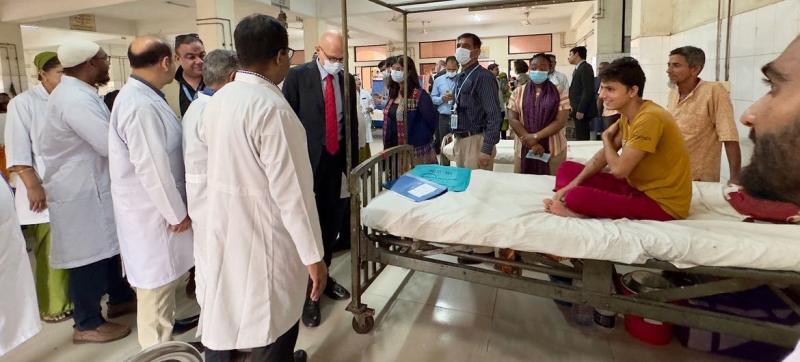
Volker Türk during a visit to a hospital in Bangladesh (archive). UN investigation: Former Bangladesh authorities committed gross human rights violations in suppressing protests Human Rights
The crackdown on mass protests in Bangladesh last year that led to the ouster of Prime Minister Sheikh Hasina left up to 1,400 people dead in just 46 days – the vast majority of them shot dead by security forces, UN High Commissioner for Human Rights Volker Türk said on Wednesday.
Thousands of people were also injured, according to a report by the Office of the United Nations High Commissioner for Human Rights (OHCHR), including a teenager who was shot in the arm at close range for throwing stones.
“There are grounds to believe that elements of the former government, its security and intelligence services, as well as violent elements associated with the former ruling party, have committed serious and systematic human rights violations,” the High Commissioner said.
Speaking in Geneva, Türk stressed that some of the worst violations described in the report could constitute international crimes that could be tried by the International Criminal Court (ICC). Bangladesh is a state party to the Rome Statute, which gives the ICC jurisdiction.
The alleged crimes in Bangladesh include “hundreds of extrajudicial killings, numerous cases of arbitrary arrest and detention, torture and ill-treatment, including violence against children, and gender-based violence,” the UN human rights chief said.
Destructive Policies
Furthermore, these violations “were committed with the knowledge, coordination and direction of the former political leadership and senior security officials, with the specific aim of suppressing protests and maintaining the former government in power.”
According to the OHCHR report, 12-13 percent of the victims were children. The Bangladesh Police also reported 44 police officers killed between 1 July and 15 August 2024.
The student protests that led to Prime Minister Sheikh Hasina’s resignation after 15 years in power were sparked by a decision to reinstate a deeply unpopular quota system for government jobs. A report by the UN Human Rights Office said the protests were also driven by “destructive and corrupt policies” that exacerbated inequality.
“I visited a hospital in Bangladesh during my visit and was able to speak to some of the survivors. Many of them will be disabled for life, especially young people… including children,” Türk told reporters in Geneva, recalling his visit to Dhaka in September.
State Violence
“The brutal response was a calculated and well-coordinated strategy by the former government to maintain power in the face of mass opposition,” the High Commissioner stressed.
“The testimonies and evidence we have collected paint a disturbing picture of widespread state violence and targeted killings, which constitute some of the most serious human rights violations and may amount to international crimes. Accountability and justice are essential for national reconciliation and the future of Bangladesh,” he added.
The OHCHR investigation in Bangladesh began on 16 September 2024. The mission included a forensic expert, a weapons expert, a gender specialist and an open source analyst. They visited protest sites, including universities and hospitals. More than 900 witness statements were also received.
